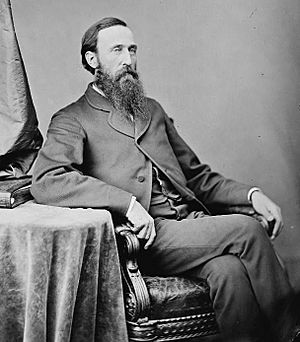Alfred Eliab Buck facts for kids
Quick facts for kids
Alfred Eliab Buck
|
|
|---|---|
 |
|
| Member of the U.S. House of Representatives from Alabama's 1st district |
|
| In office March 4, 1869 – March 3, 1871 |
|
| Preceded by | Francis W. Kellogg |
| Succeeded by | Benjamin S. Turner |
| Personal details | |
| Born | February 7, 1832 Foxcroft, Maine |
| Died | December 4, 1902 (aged 70) Tokyo, Japan |
| Resting place | Arlington National Cemetery |
| Political party | Republican |
| Alma mater | Waterville College |
| Signature | |
| Nickname | "Boss Buck" |
Alfred Eliab Buck (born February 7, 1832 – died December 4, 1902) was an important American politician. He served as a U.S. Representative for the state of Alabama. He also had a career in the military and as a diplomat.
Contents
Early Life and Military Service
Alfred Buck was born in Foxcroft, Maine. He went to Waterville College, which is now called Colby College, and finished his studies in 1859.
During the Civil War, Alfred Buck joined the Union Army. He started as a captain and later became a lieutenant colonel. He was recognized for his bravery and was promoted to colonel. He left the army in June 1866.
Political Career
After the war, he helped write the new rules for Alabama as a delegate to their constitutional convention in 1867. He also worked as a clerk for the court in Mobile County from 1867 to 1868.
Alfred Buck was a member of the Republican Party. He was elected to the Forty-first Congress. He served as a U.S. Representative from March 4, 1869, to March 3, 1871.
In 1873, he became the president of the city council in Mobile. From 1874 to 1889, he worked as a clerk for the U.S. courts in Atlanta, Georgia. Later, he served as a U.S. marshal for northern Georgia from 1889 to 1893.
Georgia Republican Party
In 1896, Alfred Buck was a main leader of the Republican Party in Georgia. He led the Republican State Convention that year. This meeting chose people to represent Georgia at the national convention. There was some disagreement about who should be chosen, but Buck worked to make sure everyone agreed.
Diplomatic Role
In April 1897, President William McKinley chose Alfred Buck to be the Minister to Japan. This meant he was the top U.S. diplomat in Japan. He served in this important role until he passed away.
Alfred Buck died in Tokyo, Japan, on December 4, 1902. He was buried at Arlington National Cemetery, a special place where many important Americans are laid to rest.
Images for kids
 | Charles R. Drew |
 | Benjamin Banneker |
 | Jane C. Wright |
 | Roger Arliner Young |

